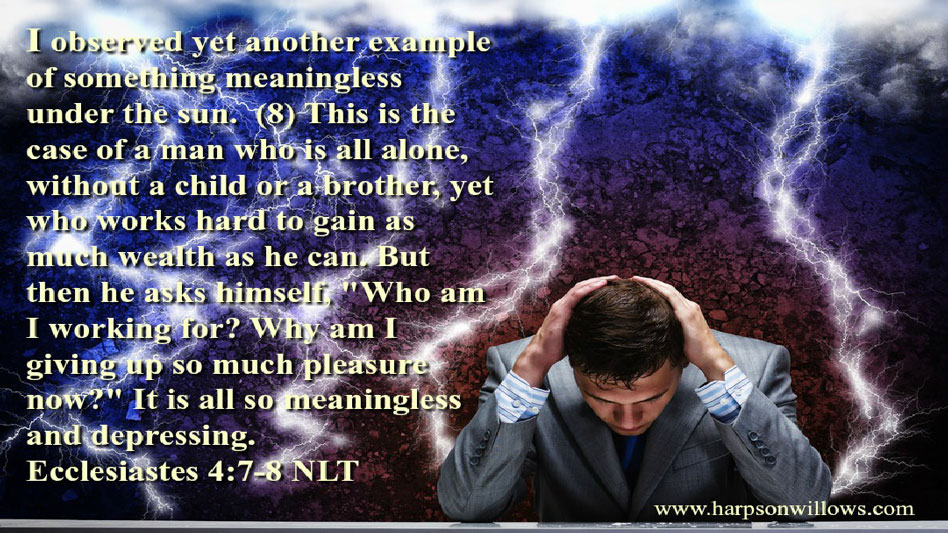Answer me quickly, O LORD! My spirit fails! Hide not your face from me, lest I be like those who go down to the pit. 8 Let me hear in the morning of your steadfast love, for in you I trust. Make me know the way I should go, for to you I lift up my soul. 9 Deliver me from my enemies, O LORD! I have fled to you for refuge! 10 Teach me to do your will, for you are my God! Let your good Spirit lead me on level ground! Psalm 143:7-10
Thursday – Depression
Thursday has finally arrived. Evidence of God’s care remains a lingering desire. Among all the burdens that must be carried in a hated job situation, it is this desire that is an unbearable heaviness.
David describes his spirit as failing, wasting away, exhausted—the picture of withering grass and vanishing clouds. Like David, we also begin to feel dispirited. This familiar despair elbows it way in and through to the front of our already emotionally overloaded minds and hearts.
Depression sets in. Dampening our spirits and deforming our perspective. It is as though we see the situation through the eyes of the Masai tribe from the movie Out of Africa. Describing this tribe, one character says “If you put them in prison, they die.” Another character asks “Why?” The response, “Because they live now. They don’t think about the future. They can’t grasp the idea that they’ll be let out one day. They think [the prison] is permanent so they die.”
Everyone in a unfulfilling job gets the Masai mentality—unable to grasp the idea of being released from the prison of an unfulfilling job. We get David’s despondence. And with him we shout to God, “If You leave me in this predicament, if Your favor remains withdrawn, I might as well be dead!”
One of Out of Africa’s themes is the innate connection of both natives and animals to their “glorious” environment coupled with the ability to die at will when oppressed and unable to be “at home.” Both will themselves to die rather than to live being all cooped up. Living without freedom is not living.
The Masai mentality describes the majority of my journey with a hated job. How many times have I prayed, “God, if this is all there is, if you are going to leave me here, please just let me die! Let an 18-wheeler hit me on the way to work. Let me run off a steep embankment. Anything!” These pleas are not the musings of a drama queen, but the real prayers of someone deeply distressed in spirit and soul because of the oppression of a hated job.
The entire situation is a constant reminder of loss—much loss. When loss fully settles in a soul, it is depressing—whether it be the loss to roam the beautiful landscapes of Africa, or lost dreams, opportunities, or time. And when God doesn’t seem to care, “Whom have I in heaven but you?” (Psalm 73:25), hopelessness intensifies exponentially. A “failing spirit” paints a good picture of this hopelessness. Day in and day out, driving back and forth, spending the best part of the day stuck where my heart is not. These fixtures seem permanent. It is near impossible to imagine being any other way.
Even Solomon gets the Masai mentality. And it applies to all people with or without children or family.
But praise be to God, no depth of despair and darkness is too deep for our loving Father to reach.
Look at David. In our Psalm he does one of the most flawless gold-medal 180’s in Scripture. In the depth of his despair, David remains confident in the Lord. In a string of seven imperatives—Answer, Hide not, Let me hear, Make me know, Deliver me, Teach me, Let Your good Spirit guide—the son of Jesse appeals to God for help based on the simple reason that David is God’s child.
And King David is confident that his request will be answered—not because he is a king or a man after God’s own heart or a member of the tribe of Judah, but because God, whose grace abounds, is God.
Remaining confident in despair seems contradictory. But for some reason God is attracted to contradictions involving distress and brokenness.
- “…a broken and contrite heart, God will not despise” (Ps. 51:17).
- “God dwells with him who is of a contrite and lowly spirit…” (Isa. 57:15).
- “God looks to the one who is humble and contrite in spirit and trembles at His Word” (Isa. 66:2).
Even in our lowest, most broken, most hopeless state, the answer to “Whom have I in heaven but you?” (Psalm 73:25), is always our loving Lord God. Our Father God who will not despise, but dwells with us and looks on us. To the only One who can truly deliver, we can take David’s lead and wrap up our string of imperatives praying “Teach me to do Your will” and “Let Your Holy Spirit guide me.” Both requests are proof that hopelessness is being transformed into hope.
Doing God’s will implies obedience, a result of redemption, and both are results of God’s grace. Grace is why David, even in his deep despair, can be confident in the Lord. Grace is also why you and I, even in our greatest distress and depression, can also be confident in the Lord.
Father God, life can sure seem bleak at times. And in those times, God I praise You! For Thine is the Kingdom and the power and the glory forever and ever! Let it be said of me what was said about Abraham—against all hope, in hope, this child of God believed. I thank You that Your grace and the love You have shown me through Your Son Jesus Christ have kept me praying and crying out to You. As desperate as the prayers may be, prayer is fundamentally hope; and evidence that amidst the trials, my faith has not faltered. And that too, is a gift of Your grace. In the Name of Jesus. Amen.




